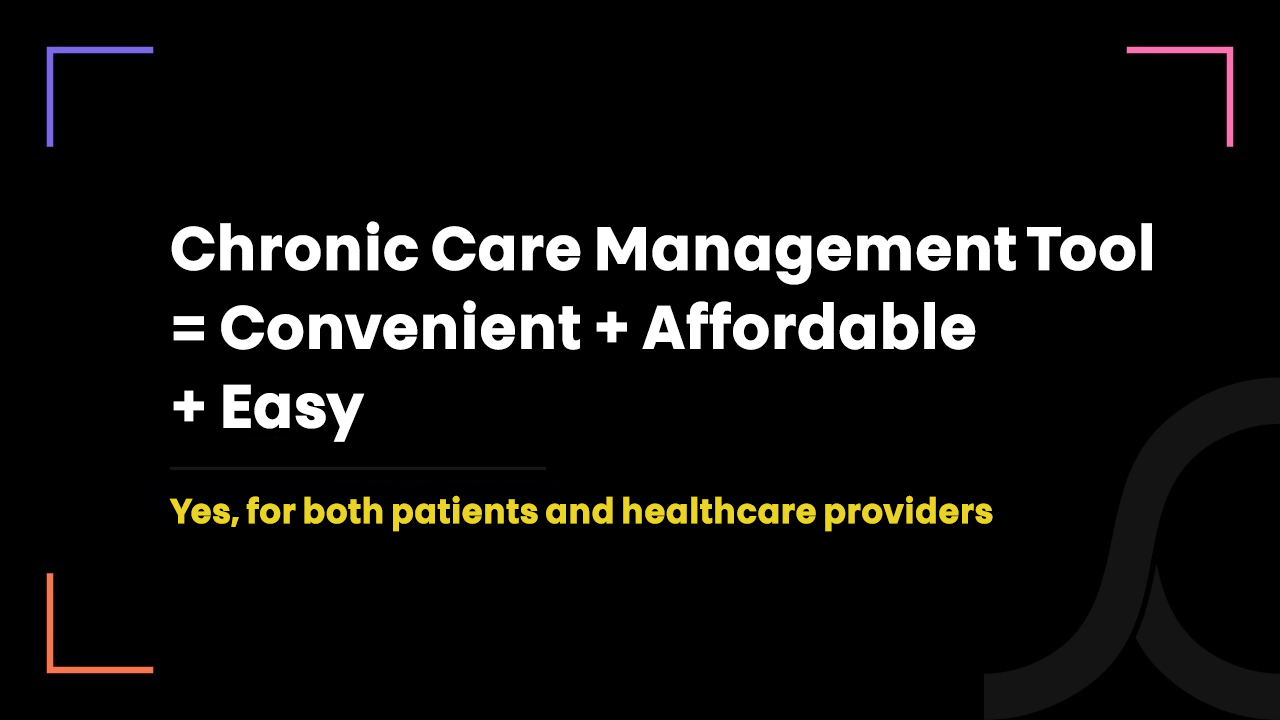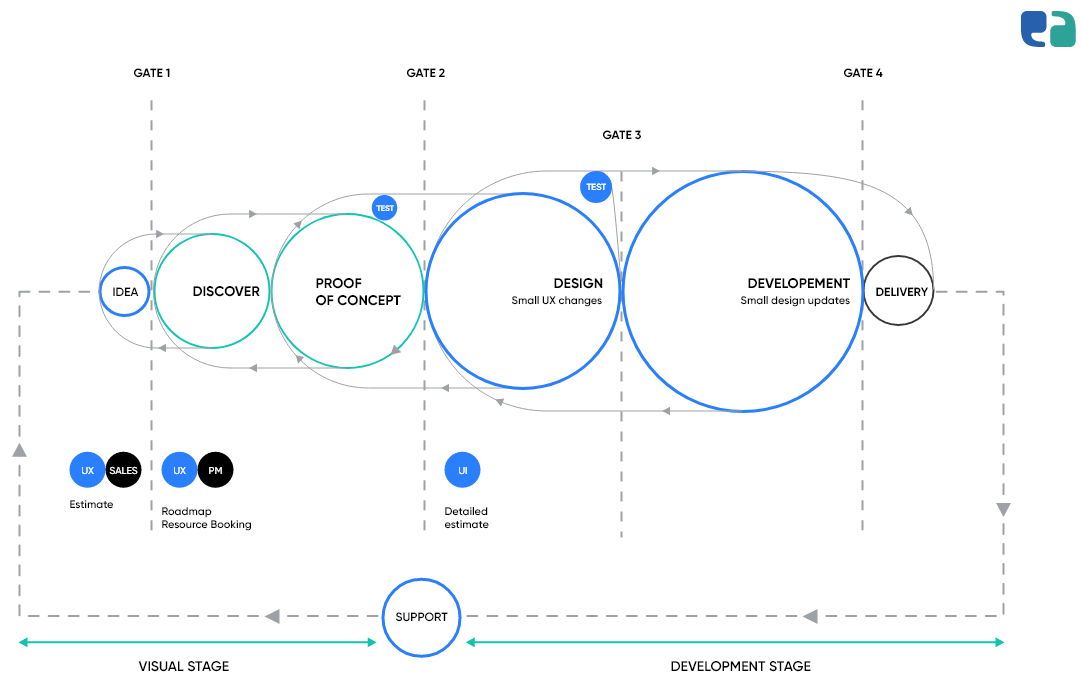What is Chronic Disease Management & How Apps are Beneficial for Chronic Care?

1 year ago
“Chronic disease or illness” – one of the primary health concerns across the globe!
However, it is not a life-threatening disease until patients receive ideal chronic disease management solutions from a chronic care specialist.
So, let’s explore chronic care management in more detail without wasting your time.
What is Chronic Disease Management?
Here is a quick example for you.
A patient is suffering from cancer and the following is the care procedure for that.
Step 1: A patient must visit a healthcare professional or oncologist regularly.
Step 2: During the visit, an oncologist analyzes the health condition of the patient by checking medical history, early-stage symptoms, and prescriptions.
Step 3: With that, the oncologist creates a diet plan, exercise technique, and medication plan.
Now, let’s explore it in technical terms.
It is the approach to analyzing and preventing various chronic conditions of the patient by performing regular checkups, exploring early-stage symptoms, and improving their lifestyle with a suitable treatment plan.
The ultimate goal of chronic pain management is to,
- Prevent chronic disease progress
- Reduce hospitalization costs
- Improve patient lifestyle and behavioral health
- Provide self-management education to the patient
However, to prevent the chronic disease progression, the patient also needs to maintain their health condition daily.
Why?
As chronic pain management is not only about consultation and medications.
In other words, self-management education also plays a vital role in chronic illness management.
What is the Care Model? What are the Elements of Chronic Illness Management?
The chronic care model is one type of structure that primary care providers and healthcare organizations designate.
With that, the healthcare system can easily provide high-quality and cost-effective chronic care solutions to patients.
And here are the elements of the chronic care model.
- The healthcare system that promotes high-quality chronic care
- A clinical information system that utilizes data to help both patient and care providers
- Delivery system designed to provide effective, efficient, and self-management care support to the patients
- A decision support system to promote evidence-based chronic care
- Self-management support to help the patients in the most appropriate way
- Community resources to meet patient needs
Why is Self-Management Important in Chronic Care Management?
A patient's lifestyle and behavioural health is the crucial aspect of chronic illness.
If the patient's well-being is poor, then consultation and medication can’t prevent the chronic illness alone.
In simple words, patients are the captain of the ship and care providers are the navigator for them!
With self-management education,
- Patients don’t need to struggle with their daily chronic illness concerns
- Improves patient satisfaction and overall care outcomes
- Healthcare professionals can provide a more quality care experience as the patients are aware of their chronic illness condition
How Does Data Help in Chronic Care Management?
As we both are familiar with that chronic conditions are the long-term disease and for that reason, data plays a vital role in preventing the chronic disease.
With artificial intelligence, data can be gathered from various resources such as medical records, lab reports, medical imaging records, and much more information.
Using analytics and data in chronic pain management,
- Can easily understand the patient's chronic condition
- Can analyze and predict the high-risk possibilities
- Can detect the early-stage symptoms
- Can help in better chronic care outcomes
However, chronic disease management affects both patients and care providers in several ways.
For instance,
- A patient is required to visit a chronic care specialist regularly
- A care provider needs to perform multiple tasks during the live-in visit
For that reason, technology is taking place in chronic care management, especially after the pandemic, to address those primary concerns.
In addition to technology, mobile and web apps are rapidly evolving in chronic disease practices.
So, let’s understand it in more detail.
How Can a Web or Mobile App Help in Chronic Disease Management?
Being a healthcare IT company, we generally have discussions with chronic care specialists.
Many share their practice challenges while many ask us directly for solutions.
The following are some of the most often asked questions by caregivers, along with our responses.
Question 1: Patients have to visit my clinic every few weeks, which is inconvenient for them. What can I do?
Answer:
We understand that it is inconvenient for patients having chronic illnesses to travel, and every in-person visit of patients also increases the workload of physicians.
And for that, the most workable solution here is a telemedicine app for chronic disease management.

Let us explain.
Patients having a chronic illness can directly talk to physicians using a mobile phone with a telemedicine app.
The physician can also write an ePrescription which gets delivered to the doorstep of patients.
In simple words, it saves time for physicians and allows patients to receive chronic care without stepping out of the home!
Question 2: Patients need to keep a record of their vital body signs but they cannot keep it accurately. What is the solution to that?
Answer:
As a healthcare-focused IT company, we comprehend that chronic pain management is not only about regular consultation.
Patients have to support physicians to identify the chronic condition in the most appropriate way by keeping a record of their vital body signs.
But, due to the lack of an easy medium to store vital body signs, patients generally fail to accomplish that.
In other words, they don’t have any easy online medium which stores the data and shares it with a physician in real-time.
To address those data records and sharing concerns, a personal health recording app for chronic care management is the best solution for that.
Using an app, patients can do things like,
- It enables patients to self-record medical data.
- Patients can easily store and share their vital body signs such as blood pressure, heart rate, and glucose level with the physicians in real-time.
Not only this, but physicians can also get reports in the form of a chart or a graph for easy understanding of patients’ conditions.

Pro tip: Rather than developing a dedicated app for just health recording, you can easily integrate this feature into the telemedicine app as it is a more convenient and cost-effective solution.
Question 3: How can patients maintain their food intake, medicines, and workout plans?
Answer:
A chronic disease management app assists the patients in every step of their care journey.
For example,
- The app reminds patients to take medicines on time.
- The app reminds patients to refill the prescription.
- The app reminds patients to do workouts.
- The app also suggests personalized workout plans based on the medical conditions of patients.
- The app reminds patients having diabetes to record blood sugar after every fixed interval. The same with patients having heart issues!
- The app also helps patients to track their food intake and follow their diet plans.

Most beneficial part: It stores every data securely and shares it with physicians in real-time so that physicians can get the idea of whether he needs to change the care plan or continue the same.
Question 4: How can an app fulfill the immediate requirement such as expert help in the case of any sudden alarming symptoms?
Answer:
- The app allows patients to have a video call with physicians within minutes.
- If the physician is not available, the app’s built-in virtual assistant which is pre-programmed and works on AI, suggests necessary actions to patients.
- The app also helps patients to find the nearest hospital or call an ambulance.
Most beneficial part: App automatically analyzes the patients’ medical data and alerts the patients and physicians in case it finds any worsening symptoms before it results in a life-threatening situation.
Explore the Case Studies to Know the Importance of the Chronic Disease Management App
Case study #1:
A case study by the University of Chicago showcases how telehealth solutions can improve the care outcomes for chronic care management.
Here are the key points of the entire case study.
- Telehealth can improve the clinical management of chronic illness
- Saves valuable time and money for both patient and care providers
- Enables the healthcare system to provide chronic care solutions in rural areas
- Improves self-management care support
Explore the entire case study: Telehealth can improve the chronic disease management
Case study #2:
As per the reports, “Three in five Canadians suffer from some form of chronic disease and the cost of treating chronic illness is increasing faster than national economic growth in Canada”.
For that reason, implementing a technology-based chronic care model can be beneficial for the healthcare system to provide evidence-based chronic care solutions.
Here are the key points of the entire case study.
- Need to provide a more effective chronic care program with the help of the mHealth apps
- Using data and analytics, primary care providers can improve chronic care outcomes
Explore the entire case study: Implementing a technology-based chronic care model
What is the Importance of Chronic Care Management Apps?
The most important aspect of the app is that – it saves valuable time and money for the patients and reduces the workflow of the care providers.
Let us understand with a scenario.
Scenario 1: A person having heart disease visits a physician on a weekly basis for normal check-ups.
He travels almost 2 miles and waits 1 hour in a waiting room for normal check-ups such as blood pressure and other reports.
The physician analyzes his condition and gives advice for the next week.
Scenario 2: A person is using a chronic disease management app.
He conducts an appointment with the physician at any time from anywhere.
A physician analyzes the condition real-time condition of the patient with the help of the app.
With that patients don’t need to travel long for a single appointment.
From the above scenario, what will you suggest? That’s the answer to your question about the importance of the app.
But still, here are some of the benefits of apps in chronic care solutions.
- Flexibility and scalability for both patient and healthcare professionals
- Reduce the cost of the treatment
- Allows better self-management for the patient
- A physician can provide more personalized care with the help of the patient's real-time data
Last but not least, enables healthcare professionals to provide a quality care experience with better clinical outcomes.
And if you want to create a chronic disease management app, we can answer all of your questions.
We are Healthcare IT Experts who are Aiming to Solve Modern Healthcare IT Concerns!
We are an Ontario-based healthcare IT company.
Our mission is simple – help healthcare start-ups, healthcare providers, and healthcare enterprises to optimize their workflows and exceed care standards with cutting-edge technology.
To accomplish this, we have a 50+ healthcare professional team including UI/UX designers, web and app developers, business analysts, QA engineers, and compliance specialists.
As a healthcare-focused IT company, we understand that every healthcare business requirements are different.
For that reason, we offer comprehensive healthcare IT solutions as per the business needs.
It includes – telemedicine web or mobile app development, mHealth app development, custom EMR/EHR development and integration, RPA solutions, AI, and IoMT services.
In case you’re wondering, explore our result-driven approach to creating the most promising and dominating healthcare IT solutions.

